Related Research Articles

The Spinners are an American rhythm and blues vocal group that formed in Ferndale, Michigan, in 1954. They enjoyed a string of hit singles and albums during the 1960s and 1970s, particularly with producer Thom Bell. The group continues to tour, without any original members, after Henry Fambrough retired in 2023.

Spinners is the third studio album recorded by American R&B group The Spinners, produced by Thom Bell and released in March 1973 on the Atlantic label. The album was the group's first for Atlantic after leaving Motown.

"Then Came You" is a 1974 song recorded by American soul singer Dionne Warwick and American R&B group The Spinners. It was credited to Dionne Warwicke and the Spinners. The track was written by Sherman Marshall and Phillip T. Pugh, and produced by Thom Bell.
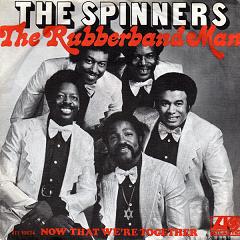
"The Rubberband Man" is a song recorded by American vocal group the Spinners. The song, written by producer Thom Bell and singer-songwriter Linda Creed, is about Bell's son Mark, who was being teased by his classmates for being overweight. Intended to improve his son's self-image, the song eventually evolved from being about "The Fat Man" to "The Rubberband Man".

"I'll Be Around" is a song recorded by the American R&B vocal group The Spinners. It was co-written by Thom Bell and Phil Hurtt and produced by Bell.
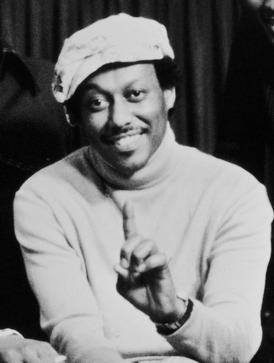
Robert Steel Smith, professionally known as Bobby Smith, also spelled Bobbie, was an American R&B singer notable as the principal lead singer of the classic Motown/Philly group, The Spinners, throughout its history. He was the principal lead singer from its formation in 1954 when he was eighteen, until his death in 2013.

"Could It Be I'm Falling in Love" is a 1972 song recorded by the American R&B vocal group The Spinners. It was co-written by Melvin and Mervin Steals, two songwriter brothers working for Atlantic, who were sometimes credited as "Mystro and Lyric." It was produced by Thom Bell, recorded at Philadelphia's Sigma Sound Studios and the house band MFSB provided the backing. Bobby Smith sings lead through most of the song, while Philippé Wynne handles vocal duties on the outro.

"One of a Kind (Love Affair)" is a song recorded by the American R&B vocal group The Spinners (known as "Detroit Spinners" in the UK). It was written by Joseph B. Jefferson and produced by Thom Bell.
"Mighty Love" is a 1973 song recorded by the American R&B vocal group The Spinners. The song was co-written by Joseph B. Jefferson, Bruce Hawes and Charles Simmons and was produced by Thom Bell.
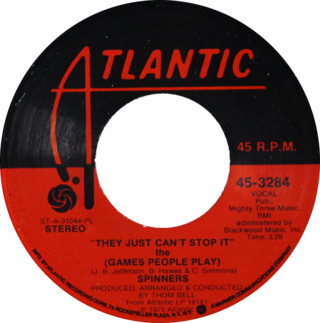
"Games People Play", also known as "'They Just Can't Stop It' The ", is a song recorded by American R&B vocal group The Spinners. Released in 1975 from their Pick of the Litter album, featuring lead vocals by Bobby Smith, it was a crossover success, spending a week at number one on the US Hot Soul Singles chart and peaking at number five on the Billboard Hot 100. Recorded at Philadelphia's Sigma Sound Studios, the house band MFSB provided the backing. Female backing vocals on the song were performed by Carla L. Benson, Evette Benton, and Barbara Ingram, who together formed the legendary studio backing vocal group Sweethearts of Sigma. The female lead vocal on the track is by Evette Benton. This song was an RIAA-certified million seller for the Spinners.
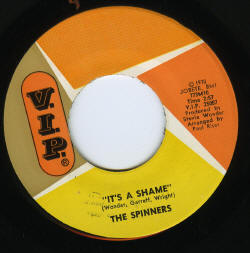
"It's a Shame" is a song co-written by Stevie Wonder, Syreeta Wright and Lee Garrett and produced by Wonder as a single for the Spinners on Motown's V.I.P. Records label. The single became the Detroit-reared group's biggest single on the Motown Records company since they had signed with the company in 1964 and also their biggest hit in a decade.
"I'll Always Love You" is a song co-written by William "Mickey" Stevenson and Ivy Jo Hunter and produced by Stevenson and Hunter as a single for The Spinners on the Motown Records label. The single became the Detroit-reared group's first charting single on the Motown Records company since they had signed with the company in 1964. The song was a top 40 pop single on the Billboard Hot 100 in the United States, on which it peaked at number 35. On the Billboard R&B singles chart, "I'll Always Love You" peaked at number 8. The song featured lead vocals by the group's main lead singer, Bobby Smith.
"That's What Girls Are Made For" is the debuting single for the American R&B/Soul vocal group The Spinners, released on Harvey Fuqua's Tri-Phi Records label in 1961.
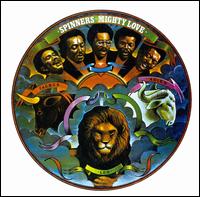
Mighty Love is the fourth studio album recorded by American R&B group The Spinners, released in January 1974 on the Atlantic label. It was the Spinners' second album for Atlantic and, like their breakthrough Atlantic debut Spinners, was produced by Thom Bell at Sigma Sound Studios in Philadelphia.

New and Improved is the fifth album by American R&B group The Spinners, released in December 1974 on the Atlantic label. Like the Spinners' two previous Atlantic albums, New and Improved was produced by Thom Bell and recorded at Sigma Sound Studios in Philadelphia.

Pick of the Litter is the sixth studio album by American R&B group The Spinners, released in August 1975 on the Atlantic label. The album was produced by Thom Bell and recorded at Sigma Sound Studios in Philadelphia.
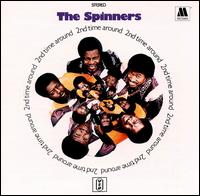
2nd Time Around is a studio album recorded by American R&B group The Spinners, released in October 1970 on Motown's V.I.P. label. This is their only album with G. C. Cameron. This is also the group's last album made while they were under contract with Motown Records; by the time of their next album, they had signed at Atlantic Records.

Happiness Is Being with the Spinners is the seventh studio album recorded by American R&B group The Spinners, released in July 1976 on the Atlantic label. It was produced by Thom Bell and recorded at Sigma Sound Studios in Philadelphia and Kaye-Smith Studios in Seattle.
"Sadie" is a song recorded by the American R&B vocal group The Spinners. The song was written and produced by Joseph B. Jefferson, Bruce Hawes and Charles Simmons. Recorded at Philly's Sigma Sound Studios and released as the third single from their 1974 New and Improved album on Atlantic Records, "Sadie" would chart at number #7 on the U.S. R&B Singles Chart, their 10th consecutive Top 10 Atlantic single on the chart. It also reached the number #54 position on Billboard Pop Singles chart.

"Ghetto Child" is a 1973 song recorded by American R&B music group the Spinners for the Atlantic label. It was written by Thom Bell and Linda Creed. It was produced by Bell, and recorded at Philadelphia's Sigma Sound Studios with the house band MFSB providing the backing instrumentation. It is notable for being one of few songs that all three main leads, Bobby Smith, Philippé Wynne and Henry Fambrough sing lead. Although some think the song focuses on racial injustice broadly and the injustice of the 1967 Detroit Riot more specifically, the lyrics suggest that the song may be about intra-racial discrimination—the song is written from the perspective of a black child who is derided not (primarily) due to his skin-color but due to his class status.
References
- ↑ "How Could I Let You Get Away / The Spinners". YouTube. 2010-01-28. Archived from the original on 2021-12-21. Retrieved 2016-10-07.
- ↑ "US Charts > The Spinners". Allmusic . Retrieved 2012-11-18.
- ↑ "The Spinners Chart History (Hot 100)". Billboard . Retrieved November 7, 2024.
- ↑ "The Spinners Chart History (Hot R&B/Hip-Hop Songs)". Billboard . Retrieved November 7, 2024.